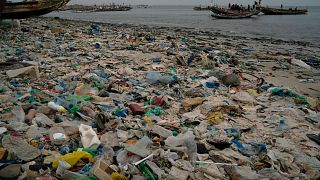Zimbabwe
There's money to be made in the trash.
Ezekiel Mabhiza digs through one of the many dumpsites that scar Zimbabwe's capital.
Sifting through the filth, discarded diapers and broken appliances, he's looking for scrap metal. It might not seem like a desirable job, but he's found it more profitable than other options.
“I left my job as a security guard during the hyperinflation era because it was no longer worth my while to be in formal employment. I would receive $30 instead of $120. I then decided to collect scrap metal, which is a cash-and-carry business, and get paid upon delivery,” he says.
By midday, his pushcart is full. Springs from old mattresses, car parts, tin cans — 66 kilograms (145 pounds) of salvaged metal. The haul earns him $8. It’s enough to feed his five children for the day, and maybe even cover a utility bill in a country where the majority of people survive through informal work.
“On a good day, I can earn between $7 and $8. I then deduct $2 to pay for hiring the push cart. After that, I am left with $5, which I take home. I'm actually able to pay my rent,” says Mabhiza.
A positive effect on the environment
Across Harare, thousands like Mabhiza live off scrap metal. The area generates about 1,000 tons of waste every day, most of which goes uncollected, according to the city council. People and companies frustrated with erratic collection dump trash on roadsides and open spaces.
They sometimes burn it. Once-pristine neighbourhoods have become polluted eyesores. Recently, the city council partnered with a green energy waste management company to improve collection amid contested accusations of corruption. But for now, informal pickers remain indispensable.
“It’s a dirty job, yes, but people rarely understand how important it is. They are society’s cleaning crew. Every piece of metal they bring here is one less item polluting our land,” says scrapyard owner Fungai Mataga.
Quietly, the collectors are helping to sustain a cleaner environment and combat climate change.
The pickers play a crucial role by salvaging non-biodegradable metals that would otherwise pollute the city. Their work also supports local steel production and contributes to reducing carbon emissions by recycling scrap metal.
Crucial scraps
Globally, scrap metal is vital to the steel industry, accounting for roughly a third of metallic raw materials used in steel production, according to the Organization for Economic Cooperation and Development. With growing concerns over the environmental impact of mining and rising interest in circular economies, demand for recycled materials is increasing. Informal pickers are the “unsung heroes,” says Joyce Machiri, head of the mining and extractives program at the Zimbabwe Environmental Lawyers Association.
“When you look at scrap, no one would actually say, ‘Wow, this a good job.’ But look at it this way, these are some of the green jobs we are talking about,” Machiri said.
The steel industry contributes nearly 8% of global energy sector carbon dioxide emissions, according to the OECD. Many steelmakers cannot afford to invest in new, cleaner technologies. That makes scrap recycling a critical — and accessible — alternative. There are no official statistics on the number of metal collectors in Zimbabwe due to the informal nature of the work.
But the job comes with some challenges. The collectors are often faced with dangerous and disgusting sights.
Lovemore Sibanda has seen it all, from medical waste such as syringes and expired medicines to rotting carcasses of pets such as dogs and cats thrown away by their owners.
“At first, I would lose my appetite for days after seeing things like that,” he says. “Now, I am used to it. This is my office. This is where the money is.”













02:23
Community forest in Eastern DR Congo tests promise of local control amid conflict
01:00
Plastic, sofas, medical waste: Bosnia’s river nightmare returns
01:32
Sudan: Volunteers plant trees to make Khartoum greener amid reconstruction
01:17
Flooding forces evacuations at Kruger National Park as extreme weather batters Southern Africa
02:28
Kenya: the man rescuing wild birds, even without a roof over his head
01:02
Deadly floods sweep Southern Africa as authorities warn of more heavy rains